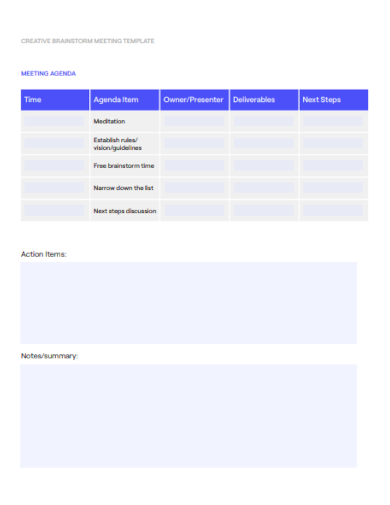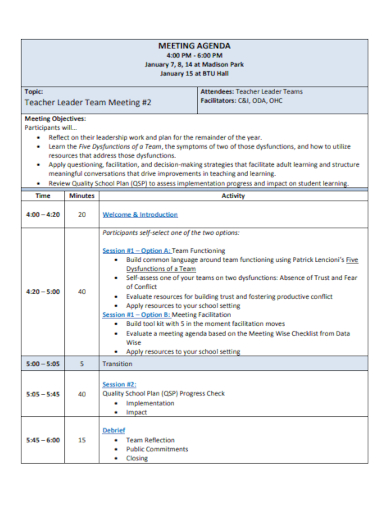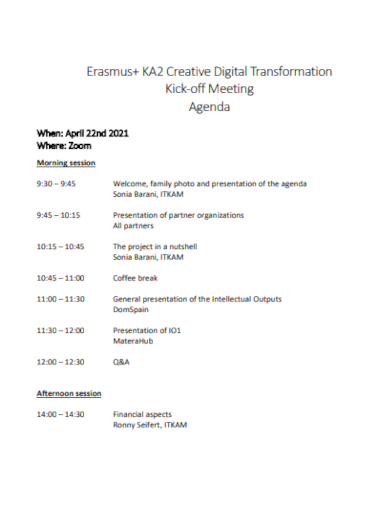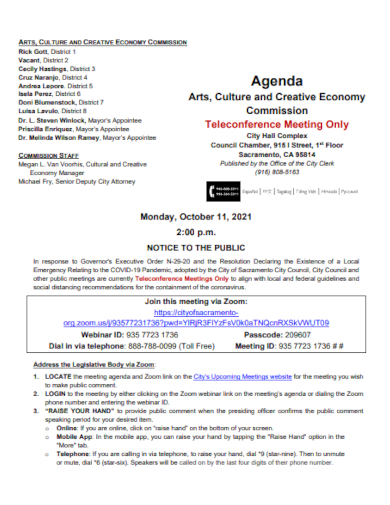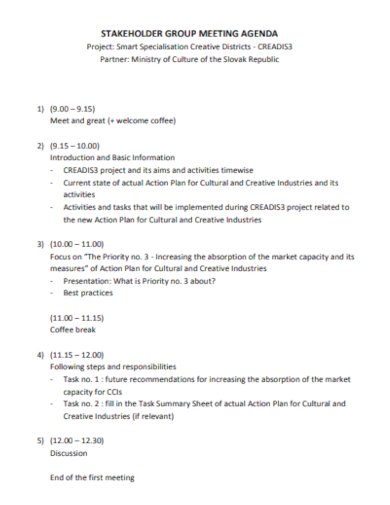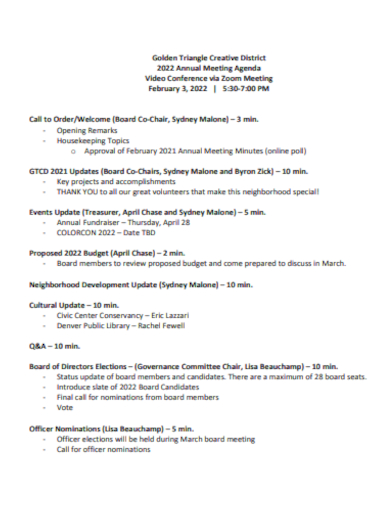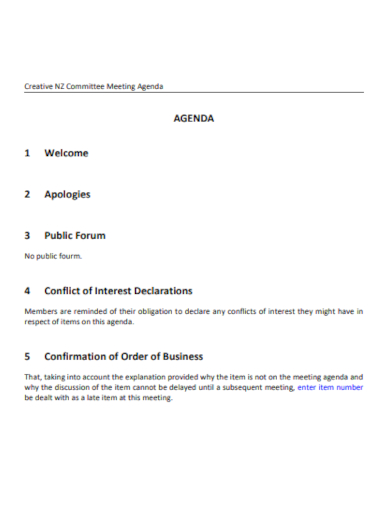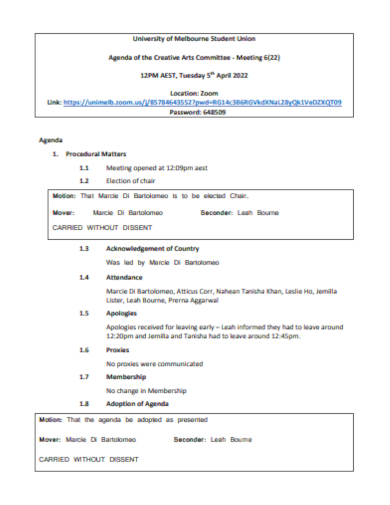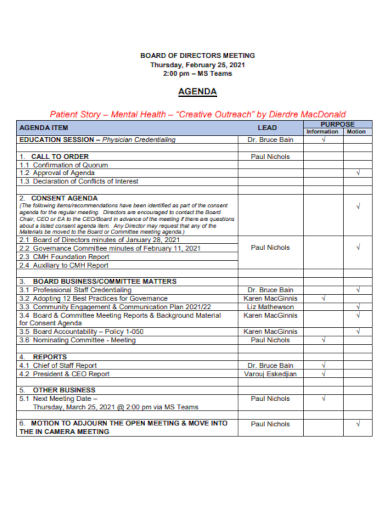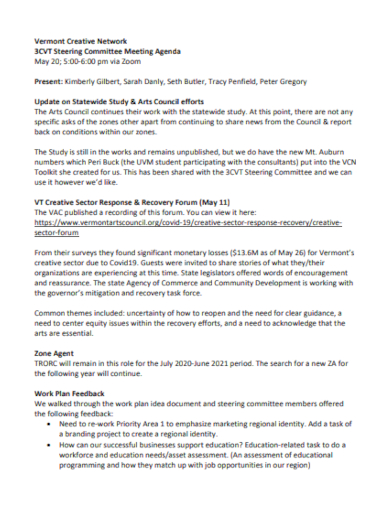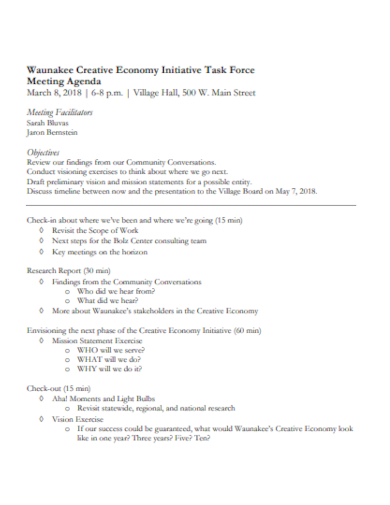We have all been a part of team meetings in which the presenters take the conversation in a direction that is unrelated to the topic at hand, and the bulk of the attendees in the meeting are left bewildered as to the purpose of the gathering. What takes place after this is a genuine tragedy. Because of the “said meeting,” your group or sales team would lose a significant amount of time without accomplishing anything. excellent news You might be able to avoid this and address all of your concerns with the help of a meeting agenda.
10+ Creative Meeting Agenda Samples
1. Creative Brainstorm Meeting Agenda
2. Creative Teacher Meeting Agenda
3. Creative Digital Meeting Agenda
4. Creative Economy Meeting Agenda
5. Creative Stakeholder Group Meeting Agenda
6. Creative Annual Meeting Agenda
7. Creative Committee Meeting Agenda
8. Creative Arts Committee Meeting Agenda
9. Creative Board of Directors Meeting Agenda
10. Creative Network Committee Meeting Agenda
11. Creative Task Force Meeting Agenda
What Is a Creative Meeting Agenda?
A list of business tasks or subjects that you would like to discuss during your meeting is an example of a creative meeting agenda. The major purpose of the agenda is to offer the attendees with a comprehensive description of what should take place during the meeting, who will lead each activity, and how long each step should continue for. If you have this information both before and during the meeting, you should be able to ensure that it goes efficiently and successfully. A gathering with clients, with family, with academics, or with anybody else would benefit from having such an agenda.
How To Make a Creative Meeting Agenda?
The implementation of a plan is something that should be discussed with the attendees of the meeting, and that is the compelling meeting agenda. Setting clear standards for what must occur prior to, during, and after the meeting will be beneficial to your team. In this essay, the main processes involved in composing one will be discussed and discovered.
Step 1- Identify Goals
Beginning with your goal will enable you to ensure that the aim of the meeting is understood and that every activity you wish to address is related to it. Be sure to identify a target that can be accomplished before your gathering begins so that it can be as productively focused as possible.
Step 2- Ask Participants for Input
If you want your participants to remain involved during the meeting, you should solicit their feedback to ensure that the event is tailored to their requirements. You could ask them to suggest particular topics or specific questions they have.
Step 3- List of Inquiries
Make a list of the questions you need to be prepared to answer during the meeting if you are aware of the aim of the meeting and have some ideas for the topics you want to cover. If you do not know the purpose of the meeting, you should not make this list. On the agendas of some meetings, a topic will be mentioned as nothing more than a phrase, such as “rental equipment.”
Step 4- Determine Goals
During the course of your meeting, every activity that you participate in should have a purpose. Exchanging information, seeking other people’s viewpoints, and making a decision are frequently the three primary goals. As you go through your agenda, make a note of the rationale behind each activity. During this stage, you will make it abundantly obvious to the participants when you are searching for their input and when a decision needs to be taken.
How does one go about making a schedule?
It is important to keep the agenda as concise and uncomplicated as you can; ideally, it should not be longer than one page. Position the time and date of the meeting at the very beginning of the agenda.
What are the goals of creating an agenda for a meeting?
An agenda can provide you and your coworkers with assistance in arranging a meeting and steering the conversation towards the issues that are being discussed. An agenda will certainly save time for all of the people who are attending a meeting because it provides a condensed list of topics, objectives, and time limitations.
What takes place when there is no predetermined agenda for a meeting?
Without an agenda, your meeting will go off in unanticipated directions. It will take more time and result in fewer outcomes. People won’t appreciate it since they won’t know where we are or what’s going on, and it will make it less enjoyable for them. It will simply be a chaotic situation.
An agenda can provide you and your coworkers with assistance in arranging a meeting and steering the conversation towards the issues that are being discussed. An agenda will certainly save time for all of the people who are attending a meeting because it provides a condensed list of topics, objectives, and time limitations.
Related Posts
FREE 10+ Business Purpose Statement Sample [ Small, Roundtable, Continuity ]
FREE 10+ Nonprofit Board Meeting Agenda Samples in PDF | DOC
FREE 10+ Team Agenda Samples in PDF | DOC
FREE 10+ Strategy Meeting Agenda Samples in PDF
FREE 10+ Family Meeting Agenda Samples in PDF
FREE 10+ Program Agenda Samples in PDF
FREE 10+ Committee Meeting Agenda Samples in MS Word | Pages | Google Docs | PDF
FREE 6+ Wedding Agenda Samples in MS Word | PDF
FREE 10+ Retreat Agenda Templates in PDF | MS Word
FREE 18+ Safety Agenda Samples & Templates in MS Word | PDF
FREE 10+ Board Agenda Samples & Templates in PDF | MS Word
FREE 10+ Interview Agenda Samples and Templates in PDF | MS Word
FREE 7+ Travel Agenda Samples and Templates in PDF
FREE 10+ Project Agenda Samples and Templates in PDF | MS Word
FREE 12+ Sales Agenda Templates in PDF | MS Word

